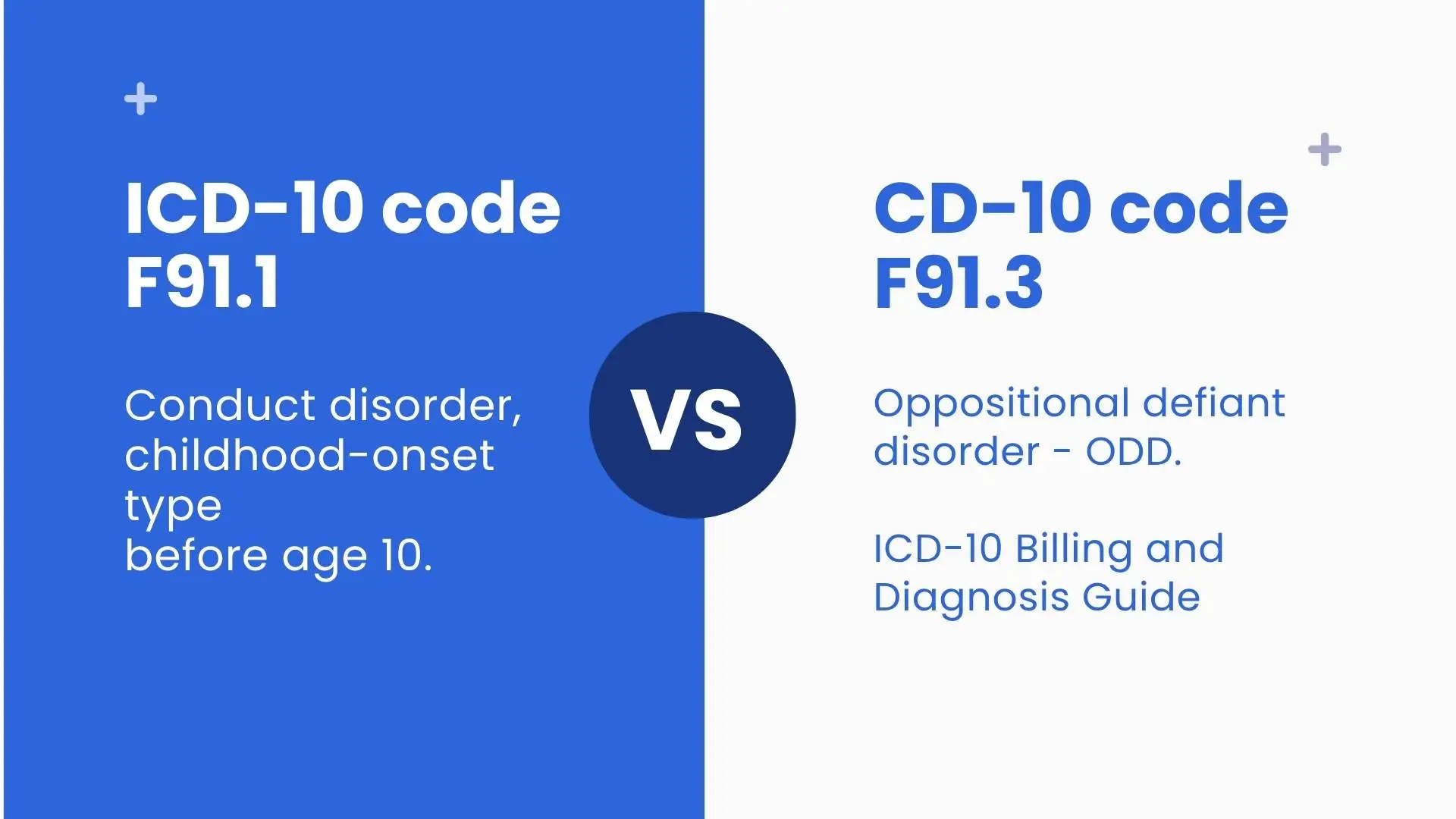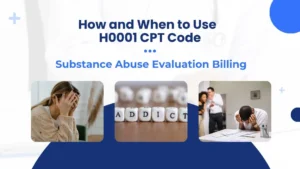ICD-10 code F91.1 Conduct Disorder and F91.3 Oppositional Defiant Disorder definitions are different and need to be understood by healthcare providers, mental health clinics, and professionals involved in billing. Mislabeling might lead to non-compliance, demotion of claims, or even treatment delays. The abundance of clinical nuances, billing complexities, and essential ICD-10 coding information about aggressive behavior, ADHD, and disruptive behavior disorders, as well as the fact that the billing process inexcusably gets in the way of the actual clinical work in your practice, makes this an exhaustive billing guide to help your practice remain compliant and profitable.
Do you realize that up to 10 percent of children experience the condition of Oppositional Defiant Disorder (ODD) and that about 5 percent of U.S. youngsters are victims of Conduct Disorder (CD)? These are not mere behavioral hiccups; they are clinical conditions that need to be documented and diagnosed, and reimbursed with proper documentation in the ICD-10 coding system.
What is F91.1 – Conduct Disorder, Childhood Onset?
F91.1 is coded, and it can be used to perform diagnostics and billing. In ICD-10, it belongs to the group of disruptive, impulse-control, and conduct disorders. This diagnosis is used when each and every time a child (under 10 years of age) engages in severe antisocial behaviors, such as aggression, destruction of property, deceitfulness, or even violation of serious rules. Such actions are long-term, willful, and not merely misbehavior.
F91.1, It is a Conduct Disorder, Childhood Onset. It contains more serious symptoms:
- R45.6 aggressive behavior ICD-10
- Property destruction
- Animal cruelty
- Unacceptable violations of the rules or crime
- ADHD is indicated by hyperactive behaviour in some of the overlapping cases (ICD-10 R45.87).
F91.1 ICD-10 Code Usage:
- The child has several behaviors of conduct disorder before 10 years of age.
- Hints of severe aggression are evident (e.g., bullying, fighting, cruelty).
- The behaviors lead to a disruption within a legal pair of children or parents.
How should we use F91.1?
- Record the start of abnormal behavior (before 10 years old).
- Include the number of times that certain behaviors occur.
- Rule out other etiologies (e.g., ADHD-only or mood disorders).
- Match up the documentation against the DSM-5 criteria of conduct disorder.
Coding and Billing Tips for F91.1
- Codes: 90791 (psych initial evaluation), 90837 (60 min treatment), or 90849 (multi-family group treatment).
- Explain upper-level services or risk codes in the event of aggression affecting a variety of settings.
- Provide supporting documents such as school reports, behavioral tests, or parent consultation.
What’s F91.3– ODD (Oppositional Defiant Disorder)?
The ICD-10 code F91.3 is billed, that is, it is used to reimburse and diagnose. It is in the same category of disruptive disorders but portrays less problematic behaviour as compared to conduct disorder. ODD is characterized by the pattern of regularly occurring temper tantrums that occur mainly due to anger, rebelliousness, and conflict with adults, often in episodes triggered by specific situations. It is regularly referred to as a diagnosis of young children, and it is believed lol to be a possible prelude to graver behavioral problems and disorders.
The following traits define oppositional defiant disorder, a disruptive behaviour disorder :
- Cf temper tantrums (ICD-10 R45.86)
- Arguments or rebellious attitude
- Anger, resentment, and irritability (ICD-10 code R45.4)
- Intentionally irritating other people
This condition is unique to aggressive behavior (ICD-10 R45.6) because it is rather emotionally uncontrollable, but not physically violent.
F91.3 ICD-10 Code Usage:
- The child constantly fights, does not obey the rules, or accuses others.
- The behavior lasts a minimum of half a year, and it affects relationships.
- No violence is committed against individuals or goods, even during episodes of anger.
How should we use F91.3?
- Distinguish it from general childhood defiance as an issue of frequency and setting, using diagnostic guidelines.
- Behaviour rating scales (e.g., SNAP-IV, Vanderbilt) validated should be used to support the diagnosis.
- Record triggers of emotional reactions, social issues, or family stress that cause behaviors.
Coding and Billing Tips for F91.3
- Such CPT codes as 90832 (30 min therapy), 90846 (family therapy without patient), or 96127 (brief emotional assessment) are frequently used.
- In your report, add functional impairment at school or at home.
- Associate with Z-codes where applicable (e.g., Z63.5 disturbances of family).
Real-Life Example: Mislabelling That Held Up Care
In a Houston behavioral children’s clinic, a boy of 9 years had been portraying aggressive behavior (ICD-10 R45.6), propensity to anger (ICD-10 R45.4), as well as impulse control problems. He was coded with F91.1 (Conduct Disorder), and the insurer raised the red flag since he had not been documented before with ODD (ICD-10 code F91.3). Upon review, the diagnosis was amended to ODD, though the delay in the processing of a claim resulted in his not having the possibility to receive the therapy for 2 months.
This shows how important it is to code diagnoses accurately and document them well when it comes to mental and behavioral health billing.
Clinical Differences Between F91.1 and F91.3
| Criteria | Oppositional Defiant Disorder (F91.3) | Conduct Disorder (F91.1) |
| Age of Onset | Normally under 8 years | Early onset (Before 10 years – Childhood-onset) |
| Severity | Mild to Moderate | Moderate to Severe |
| Symptoms | Debating, rebellious, rage-filled, short-tempered | Aggression, disorders of property, severe breach |
| DSM-5 Criteria | Emotional dysregulation | Wilful infringement of the rights of others |
| Associated Codes | R45.4, R45.6, F90.9(ADHD) | R45.6, F91.2, F90.0 (ADHD inattentive) |
Related Comorbidities & ICD-10 Codes
There are a number of comorbid or secondary conditions witnessed in a range of patients with ODD or Conduct Disorder. Proper documentation of all the symptoms assists in clean billing.
| Condion | ICD-10 Code |
| ADHD Unspecified | F90.9 |
| ADHD, Inattentive type | F90.0 |
| Selective Mutism | F94.0 |
| Reactive Attachment Disorder (DOD) | F94.1 |
| Tic Disorder | F95.9 |
| Irritability | R45.4 |
| Aggressive Behaviour | R45.6 |
| Combative Behaviour | R45.6 |
| Impulse Control Disorder | F63.81 |
| Learning Disorder | F81.9 |
| Temper Tantrums | R45.86 |
The importance of Accurate Coding
When there is wrong billing of ODD vs. Conduct Disorder, this can lead to:
- Denied claims
- Delayed care
- Auditing or compliance risk
- Under-reimbursement
That is when there are partners with experience such as Providers Care Billing LLC, We are a trusted Medical Billing and Coding Company. Our services include Revenue Cycle Management Services and Credentialing. Our team makes mental health providers remain compliant and makes the best out of reimbursements.
For cases involving medications without a specific code, see our billing guide on how to use HCPCS code J3490 for unclassified drugs.
Billing Scenario
An actively working mother of a 7-year-old boy diagnosed with ODD, ADHD (inattentive type), who attends weekly behavioral therapy.
Right ICD-10 Codes:
- F91.3 – Disturbance of conduct – Oppositional defiant disorder, which may include episodes of aggressive behavior.
- F90.0 – ADHD Predominantly inattentive, which may co-occur with episodes of anxiety or depressive symptoms.
- R45.4 – Irritability-State, which may occur in conjunction with anxiety or depressive disorders.
Services Billed:
- CPT 90834 Psychotherapy (38 -52 minutes)
- CPT 96127 -Short behavior-emotional screening (applied with R45.86 or R45.6 of the ICD-10 code) with the help of which it is possible to define cases of either manic or depressive behavior.
Sick of behavioural health claims denial?
Allow Providers Care Billing LLC to code your doctors, documentation audits, and claim-payer disputes. We focus on disruptive behavior disorder ICD-10 billing with an eye on making every code tell the right story and be paid.
👉 Get in touch with us today and simplify your mental health billing services.
📞 Call Now: 888-495-3786
📧 Email: Info@providerscarebilling.com
Checklist Documentation F91.1 and F91.3
- Write the duration of the document and the severity of the behavior.
- Use examples of school, home, or community.
- Cite DSM-5 criteria of behavior, especially in relation to episodes of irritability or defiance.
- State the intervention efforts that were attempted and their results, including any updates on treatment efficacy.
- Line up teachers, parents, or juvenile services (where indicated).
Conclusion
Effective treatment of behavioral conditions, such as Oppositional Defiant Disorder (F91.3) and Conduct Disorder (F91.1), depends on correct diagnosis and proper billing that will fully reimburse them in due time. Correct coding with ICD-10 codes, knowing the clinical difference, and reporting any comorbidities, be it ADHD or aggressive behavior, contributes to the ease of claim approvals. The help of an expert Medical Billing Company, such as Providers Care Billing LLC, can help mental health providers to mitigate denials, remain in compliance, and enhance revenue. Along with the need to deal with the complicated cases of pediatric behavioral patients or regular billing of the therapy, masterful coding and Revenue Cycle Management Services are what separates clinical and financial prosperity.
FAQS
Q: What is the icd 10 code for oppositional defiant disorder?
F91.3 is a billable medical code ICD-10-CM code for ODD.
Q: Is ODD equal to Conduct Disorder?
No. Conduct Disorder (F91.1) is more violent and entails latching onto the rights of others, and the ODD (F91.3) is emotional stubbornness and frustration.
Q: Is it possible to develop ODD and ADHD at the same time as a child?
Yes, it is comorbidity. Apply F91.3 along with F90.0 (ADHD inattentive) or F90.9 (ADHD unspecified) in case both of these conditions are diagnosed.
Q: What is the code for the aggressive 0% behaviour?
Use R45.6 for non-aggressive, aggressive, or violent behavior.
Q: Do adults and children with ODD have different codes?
ODD usually manifests itself in childhood. In adult equivalents, another category of ICD-10, such as impulse control disorders or personality disorders, may be applicable.




